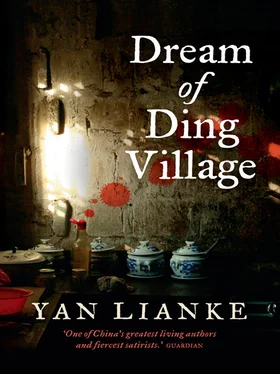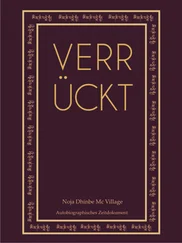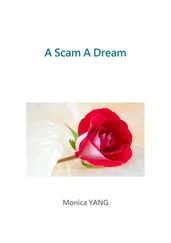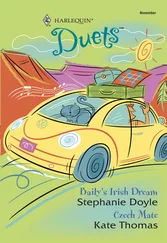The fifth thing Grandpa learned was that AIDS had originally been a foreigners’ disease, a big-city disease rumoured to affect only deviant people. But now China had it, too. It was spreading across the countryside, and those who were getting sick were normal, upstanding people. The sickness came in waves, like swarms of locusts descending over a field and destroying the vegetation. If one person got sick, the only certainty was that many more would soon follow.
The sixth thing was that if you got AIDS, you died. AIDS was a new, incurable disease, and no amount of money could save you. But the sickness had only just begun: that was the seventh thing. The real explosion wouldn’t come until the next year, or the year after next. That’s when people would start dying like moths to a flame. Right now they were dying like dogs, and everyone knows that in this world, people care a lot more about dogs than they do about moths.
The eighth thing was about me, buried behind the brick wall of the elementary school. I was only twelve, in my fifth year at the school, when I died. I died from eating a poisoned tomato I found on the way home from school. Six months earlier, somebody had poisoned our family’s chickens. Not long after that, my mother’s pig had died after eating a poisoned chunk of radish. It was just a few months later that I found the tomato sitting on a rock by the side of the road. Someone must have put it there, knowing I’d see it on my way home from school. As soon as I’d eaten it, my belly started to ache, like somebody was stabbing my insides with scissors. Before I could walk more than a few steps, I fell down in the middle of the road. By the time my dad found me and carried me home in his arms, I was frothing at the mouth. By the time he laid me on my bed, I was already dead.
I died not from the fever, not from AIDS, but because my dad had run a blood-collection station in Ding Village ten years earlier. He bought blood from the villagers and resold it for a profit. I died because my dad was the biggest blood merchant not just in Ding Village but in Two-Li Village, Willow Hamlet, Yellow Creek and dozens of other villages for miles around. He wasn’t just a blood merchant: he was a blood kingpin.
The day I died, my dad didn’t even cry. He sat at my bedside and smoked a cigarette. Then he went out into the village with my uncle, his younger brother. My dad carried a pointed shovel; my uncle had a chopping knife with a gleaming blade. They stood at the village crossroads, cursing and screaming at the top of their lungs.
‘Come and show your faces, if you’ve got the guts!’ shrieked my uncle, Ding Liang. ‘Don’t think you can hide, you poisoning bastards! Come out and see if I don’t chop you in two!’
‘So you’re jealous of me, is that it?’ shouted my father, Ding Hui, planting his shovel in the ground. ‘Can’t stand it that I’m rich and didn’t get the fever? Well, fuck you and all your ancestors! First you kill my chickens, then my pigs, and now you think you can get away with poisoning my boy?’
Shouting and cursing, the brothers stood at the crossroads from noon until the sky grew dark, but not a single villager came out. No one wanted to answer to my uncle, or face up to my father.
In the end, all they could do was bury me.
They put me in the ground and buried me.
By tradition, I was too young to be buried in the ancestral grave, so Grandpa carried my little corpse to the elementary school, where he lived as a caretaker. He made me a narrow wooden coffin, filled it with my schoolbooks, notebooks, pencils and pens, and buried it outside the schoolyard, behind the back wall of his house.
Grandpa had always fancied himself as a scholar. He’d gone to school, spent a lifetime as the school caretaker and bell-ringer, and was known throughout the village as Professor Ding. So it was only natural that he’d want to bury me with my books: a favourite storybook, a collection of folk tales, a few volumes of Chinese myths and legends, and a Chinese and an English dictionary.
After I was gone, Grandpa would sometimes stand at my grave and wonder if the villagers would try to kill anyone else in our family. Would they poison his granddaughter, my younger sister Yingzi? Or his only remaining grandson, my uncle’s boy Little Jun? He began to think about making my father and my uncle go to every house in the village and kowtow. Make them kneel in the dirt, knock their heads upon the ground three times and beg the villagers not to poison any more of our family. Beg them not to leave us without descendants to carry on the Ding family name.
At about the same time Grandpa was mulling this over, my uncle came down with the fever.
Grandpa knew that it was retribution. Uncle was sick because he’d once worked for my father, buying blood from the villagers and reselling it at a profit. When Grandpa found out that Uncle was sick, he changed his mind about asking him to kowtow to all the villagers, and instead decided to have my father do it alone.
The ninth thing my grandpa learned was that within a year, perhaps two, the fever would spread across the plain. It would burst upon us like a flood, engulfing Ding Village, Willow Hamlet, Yellow Creek, Two-Li Village and countless others in its path. Like the Yellow River bursting its banks, it would surge through dozens, maybe hundreds of villages. And when that happened, people would die like ants. The dead would litter the ground like fallen leaves. In time, most of the villagers would die, and Ding Village would vanish for ever. Like leaves upon a dying tree, the villagers would wither and fall to the ground, to be swept away by the wind.
The tenth thing Grandpa learned was that the higher-ups wanted to quarantine all the sick people in the village so that they wouldn’t spread the fever to the healthy ones, to those who hadn’t sold blood.
‘Professor Ding,’ the cadres said. ‘Your son was the biggest blood merchant in the village, so it’s only fair that you step up now. You have to use your influence to convince everyone who is sick to move into the village school.’
When he heard this, my Grandpa was silent for a very long time. Even now, it makes him uncomfortable, makes him think thoughts that are better left unspoken. When Grandpa thought about my death, he wanted to force my father, the blood kingpin, to go down on his knees and kowtow to every family in the village. And when that was done, my father could throw himself into a well, swallow some poison, or hang himself. Any method would do, as long as he died. And the sooner, the better, so that everyone in the village could witness his death.
It was a shocking thought to imagine my father grovelling before the villagers and then being made to commit suicide, a thought Grandpa hadn’t thought himself capable of. But when the shock had passed, Grandpa began walking into the village in the direction of our house.
He was really going to do it. He was going to ask my father to apologize to everyone and then to kill himself.
Because the sooner my father died, the better.
2
What happened to Ding Village was unthinkable: in less than two years, this tiny village of fewer than 200 households and 800 people had lost more than 40 people to the fever. Over the last year, there had been an average of two or three deaths per month. Hardly a week went by without someone dying. The oldest were in their fifties and the youngest just a few years old. In each case, the sickness started with a fever lasting several weeks, which is how the disease got its nickname ‘the fever’. It had spread until it had the village by the throat, and now there seemed no end to the stranglehold. No end to the dying, and no end of tears.
The village coffin makers had worn through several sets of tools and had to keep replacing their hatchets and saws. But the season of death had only just begun. In the months to come, the dead would number like the autumn grain, and graves would be as common as sheaves of wheat.
Читать дальше












